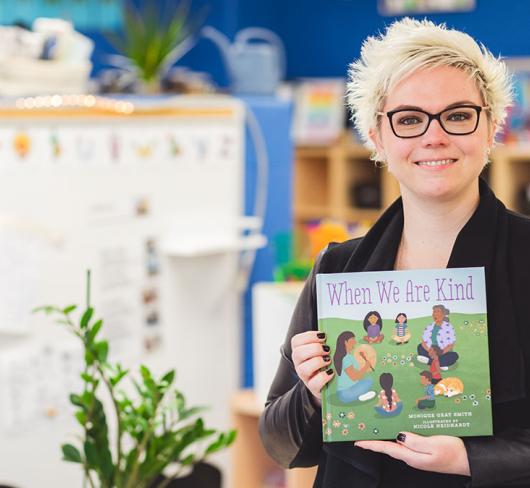
End EQAO
This fall the Education Quality and Accountability Office (EQAO) will be releasing the results of the Grade 3 and Grade 6 EQAO assessments for the first time since 2019. These results were a product of a tumultuous assessment process; the re-introduction of standardized testing during the ongoing pandemic with a new digital platform which experienced many technical difficulties was only the beginning. However, it is the mounting research that requires us to critically question the upcoming EQAO results and demand that the practice of standardized testing in Ontario come to an end.
ETFO has long advocated for the end of standardized testing in our schools and continues to be active in promoting academic alternatives. As educators, we know that genuine learning is driven by students’ natural curiosity and our ability to harness that curiosity in the classroom. Genuine learning is not standardized. It is risky, complex, unpredictable and original. That is why standardized testing assessments like EQAO do not ultimately help students succeed. It is impossible for arbitrary and artificial tools, such as EQAO, to measure and attach a meaningful number to the quality of our students’ original thoughts and personal growth.
The NDP, Liberal Party and Green Party promised to end EQAO testing in the recent provincial election. The view of education as economically market-driven, technocratic, measurable and quantifiable through standardized testing is changing. It is crucial to recognize that standardized testing is ineffective, biased towards upper-middle class white test-takers and only provides a blurry snapshot of student learning. Instead of measuring standards of outcome, we need to begin measuring standards of opportunity for Ontario students.
Two publications summarize recent research regarding how standardized tests are more harmful than beneficial for the healthy and holistic development of children: The Pedagogy of Standardized Testing: The Radical Impacts of Educational Standardization in the US and Canada by Arlo Kempf and Decolonizing Educational Assessment: Ontario Elementary Students and the EQAO by Ardavan Eizadirad.
Kempf supports ETFO’s position that teaching is intellectual and technical work. Teaching is rocket science, an art and a passion. Teaching is full of love. It is about building relationships. It is a journey. It is about both students and teachers having the right to be curious.
To the contrary, standardized tests require winners and losers. This dichotomy leads to students believing they are not good enough. It promotes competition over collaboration and deteriorates the relationship between schools and families. It also leads to a narrowing of the curriculum forcing teachers to work away from evidence-based teaching and learning in the arts, history, critical thinking and culturally relevant and responsive pedagogy.
Eizadirad writes that although standardized tests are supposed to help identify inequities in the education system, EQAO has not led to closing the achievement gap along the lines of race and socioeconomic status since its inception. This trend also exists in the United States. The same test-based achievement gaps along race and economic class have existed since the first standardized test was administered over 100 years ago.
While all tests have biases, standardized tests are biased in standardized ways; young people are evaluated in the same way at the same time by the same test despite their different experiences and unique learning needs. A standardized test is designed by those who are the social power holders. It excludes a diversity of interpretations and therefore perpetuates inequities.
Impact on Students
In his interviews with Grade 3 students and their families, Eizadirad observed the negative emotions associated with EQAO and students’ fear of failure and perceived consequences of doing poorly. The atmosphere around the importance of the test contributes to children feeling extremely pressured, anxious, nervous and scared.
The responses of the Grade 3 children, as observed by Eizadirad during their interviews, regarding stress, anxiety and fear of failure associated with writing the EQAO tests align with the findings of National Center for Fair and Open Testing; the participation of young children in standardized tests has harmful effects that impact their “healthy development and learning.”
In addition to the negative emotions regarding EQAO, Eizadirad refers to several other practices causing invisible and traumatizing scars for students in Ontario. For example, both the EQAO test itself and the administration process are counterproductive and harmful for students who are identified with exceptionalities as it makes them feel excluded and different. Additionally, Eizadirad argues that EQAO tests are culturally and racially biased, promoting a Eurocentric curriculum and way of life that privileges white students and those from higher socioeconomic backgrounds while simultaneously lacking relevant connections to the identities and lived experiences of racialized students and families from lower socioeconomic backgrounds.
Eizadirad draws our attention to the fact that events in our lives that arouse severe negative emotions typically have long-lasting impacts later in life. Therefore, the socioemotional impact of preparing and writing the Grade 3 EQAO test does not stop once the testing is complete.
EQAO results are shared with students and their families early the following school year. A poor result can lead to feelings of self-doubt and reduced self-confidence, leading to a self-fulfilling prophecy of continued lower achievement.
Eizadirad argues that this “external assessment as stereotyping is structurally violent for racialized children and those from lower socioeconomic backgrounds as it diminishes their self-confidence, creates doubt in their competencies and leads to absenteeism.
The Accountability Myth
Even before the pandemic, “closing the achievement gap” was a popular buzzword often used by educational policymakers and politicians. However, the effects of the pandemic have created even more urgency for educators, families and politicians. As Eizadirad argues, EQAO has not led to closing the achievement gap and our collective discourse should instead be about the disparities in the opportunity gap that students experience.
Eizadirad quotes the research of Bower and Thomas (2013). They emphasize how the current administration of standardized tests leads to the reproduction of social classes without anyone being held accountable or responsible for shortcomings and underfunding of the education system.
Kempf further argues that standardized tests transfer accountability from the government and the underfunding of the education system to teachers. This transfer of accountability creates the foundation to attack educators through de-professionalization and leads to dehumanizing experiences for students.
Instead, the marks of standardized tests should be seen as a measure of the chronic underfunding of schools and the learning debts the educational system owes students and teachers. Our discourse needs to shift from achievement gaps to opportunity gaps.
In our post-pandemic education system, we must advocate for investment in the system instead of diverting funding to testing companies.
What Is Important
Overall, Eizadirad’s findings indicate that the Grade 3 EQAO standardized test is more harmful than beneficial for the healthy holistic development of children. This sentiment was also supported in the recent Royal Society of Canada Policy Briefing, Children and Schools During COVID-19 and Beyond: Engagement and Connection Through Opportunity (August 2021), where chapter 7 author Andy Hargreaves recommended that engagement and re-engagement with learning is the pathway to achievement, not large-scale standardized testing of whole cohorts of students. Engagement and re-engagement need to include building classroom community, allowing time for creative play, developing conflict-resolution skills and granting permission to be curious. Eizadirad calls this a soulful school that meets the needs of all children through holistic learning that integrates body, mind, emotions and spirit. Eizadirad further argues that we need to deviate from standardization and instead work towards promoting biodiversity of ideas, knowledge, culture and history where children are intrinsically motivated to care about themselves and their communities.
Conclusion
Eizadirad states that “the current normalized and legitimized neoliberal market-driven model of education, with its reliance on standardized testing as an accountability tool, homogenizes the needs of all students and communities by disregarding them as holistic beings and dynamic communities and instead judges them predominantly by results and performance on standardized tests.”
The alternative is classroom-based formative assessment, as suggested in the 2011 Ontario Teachers’ Federation report titled A New Vision For Large-Scale Testing In Ontario. OTF argues that classroom-based formative assessment is a more reliable indicator of individual achievement and more closely aligned with the best strategies for individual student improvement.
Because of ETFO members’ expertise in conducting classroom-based formative assessments, families feel their children are understood and valued. ETFO supports members with innovative assessment tools through the assessment website at etfoassessment.ca and workshops available through local partnership programs.
After EQAO results are published this fall, let us stand in solidarity in our commitment to evidence-based classroom formative assessment to improve student learning and demonstrate why this is the path of recovery from our interrupted lives during the pandemic rather than prioritizing the flawed model of EQAO.
Tara Zwolinski is a member of the ETFO executive staff.

